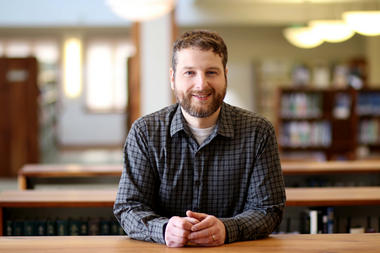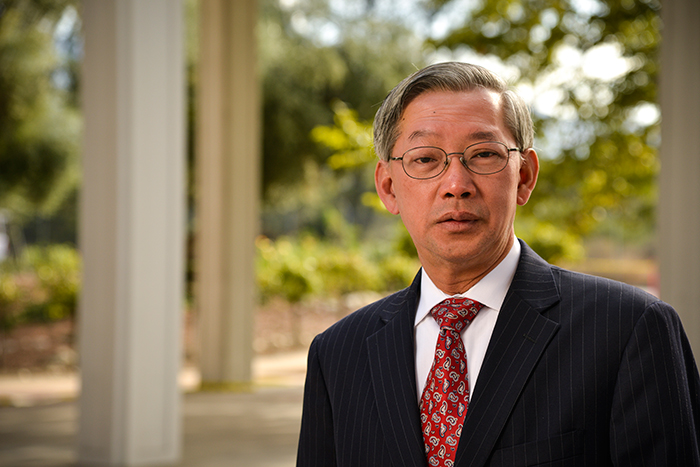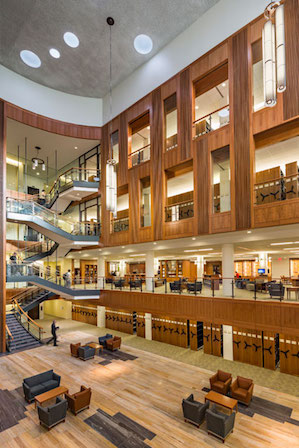
As the Internet Archive digitizes an increasing amount of material from seminary libraries, future church leaders are using modern technology to easily access ancient teachings.
Claremont School of Theology, Hope International University, Evangelical Seminary, Princeton Theological Seminary, and Anabaptist Mennonite Biblical Seminary have all recently donated portions of their library collections to the Internet Archive or are working with the Internet Archive to digitize their materials. The scanned books and periodicals will be available freely online at archive.org to anyone who wants to check them out one item at a time through Controlled Digital Lending.
The move solved logistical and storage problems for Claremont, Hope and Evangelical, all of which were relocating or downsizing. Faced with a space crunch, transforming their collections from print to digital format allowed the libraries to provide continual access – and extend their reach.
For Anabaptist Mennonite Biblical Seminary (AMBS), partnering with the Archive has enabled it to get textbooks in the hands of students who are learning at a distance. With campus buildings closed during the pandemic, libraries have been clamoring for ebooks but many vendors do not sell or license to libraries, creating a barrier to learning for disadvantaged students.
Online access through the Archive has also expanded checkout privileges to alumni, which is a major issue for academic libraries.

“Theological education aims to develop lifelong learners, so the need for the library doesn’t stop at graduation. A free online library is a huge resource,” says Karl Stutzman, director of library services at AMBS. “Church leaders who are reflective and compassionate have an impact on communities of faith, which in turn have an impact on their neighborhoods and nations. Increasingly, we are educating church leaders who are mobile and international. They need high quality online resources.”
Through a collaborative project with the Archive, AMBS has scanned 100 years of the Gospel Herald and The Mennonite journals. Having the materials available digitally, means users can search for articles or names without having to page through documents manually. The Archive has also digitized some older books that were out of print, bringing new life to the titles. In one instance, rights to a book went back to a faculty member author, who was pleased to make his book freely available online and used in a recent class that wouldn’t otherwise be available, says Stutzman.
Resources at the theological school have a long shelf time, but are not always available from publishers in electronic versions, says Stutzman. Scanning items the library already owns provides needed access through the CDL model. AMBS’s digital library (which continues to grow), along with the rich collections from other seminary libraries, will conveniently allow religious leaders to study and further their education, he says.
“Library resources need to be shared. The world is already so unequal.”
Jeffrey Kuan, president, Claremont School of Theology
In June, Claremont School of Theology donated 250,000 volumes from its library to the Internet Archive as its campus faced a move from Southern California. It is in the process of affiliating with Willamette University in Salem, Oregon, and President Jeffrey Kuan is guiding the school through the transition.
“It was going to be very expensive to relocate the entire library collection. It would cost us millions of dollars, plus annual maintenance,” says Kuan, who didn’t want to consider disposing of the collection.
At the same time, Claremont’s 300 students were increasingly using online resources since the school started the Digital Theological Library (DTL), a consortium with 40 institutions housing over 600,000 digital books and tens of millions of articles. After the DTL was launched, students at Claremont began accessing the digital collection five times more than the physical collection on campus.

Kuan oversaw the transfer of 50,000 volumes from Claremont to Willamette and the rest were packed up for scanning by the Archive. The donated items include a wealth of books in feminist theology, Afro-Carribean spirituality, as well as the school’s Ancient Biblical Manuscripts Collection. Kuan says seeing theological education in a global context, there is great need in Asia, Africa and Latin America for library resources.
“We saw it both from a financial perspective that it made sense and as a contribution to the distribution of knowledge to the world that it makes perfect sense,” Kuan says. “Library resources need to be shared. The world is already so unequal.”
On the other side of the country, Princeton Theological Seminary has also been a leader in making its collection available online. It partnered with the Archive in 2008 to establish a regional digitization center on the East Coast to scan materials in the public domain. It later created the Theological Commons with 150,000 digital resources on theology and religion drawn from numerous research libraries and digitized by the Archive.

“We’ve utilized the Internet Archive approach of making these [public domain] materials not just publicly viewable, but also downloadable,” says Greg Murray, director of digital initiatives at Princeton Seminary. “We’ve built a custom, subject-matter specific, digital library that far exceeds what we could have done with our own collection. That’s what we love about the Archive…the openness and technical infrastructure to provide materials that are relevant to our researchers.”
Like other seminaries, Princeton Seminary is a small institution—separate from Princeton University. It is a stand-alone seminary with less than 400 students and doesn’t have the resources on the scale of a divinity school associated with a large university. That made digitizing its collection and collaborating with other seminaries a draw, says Murray.
While the full impact of the open collection is hard to measure, materials are being accessed from users domestically and internationally. Now the seminary is beginning to add copyrighted items to the Archive in the CDL system, providing a wealth of resources in various disciplines, Murray says.
“Access is the biggest benefit. And when you have a public health crisis, the benefit is even more pronounced having these materials online,” Murray says. “It’s also available to anyone around the world who can’t travel to Princeton….It seems like a natural extension of what the library has always done.”
Stutzman of AMBS says he’s excited about so much new theological content being available worldwide. “The reality is that Christianity is not just a U.S. phenomenon,” he says. “The hot spots using this material are often overseas in under-resourced areas. Having these materials available online in places that are just getting the Internet is going to be a really welcome addition.”